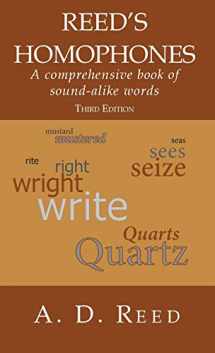
Reed's Homophones: A comprehensive book of sound-alike words
ISBN-13:
9781942016199
ISBN-10:
1942016190
Author:
A. D. Reed
Publication date:
2016
Publisher:
Pisgah Press LLC
Format:
Hardcover
154 pages
FREE US shipping
Book details
ISBN-13:
9781942016199
ISBN-10:
1942016190
Author:
A. D. Reed
Publication date:
2016
Publisher:
Pisgah Press LLC
Format:
Hardcover
154 pages
Summary
Reed's Homophones: A comprehensive book of sound-alike words (ISBN-13: 9781942016199 and ISBN-10: 1942016190), written by authors
A. D. Reed, was published by Pisgah Press LLC in 2016.
With an overall rating of 4.2 stars, it's a notable title among other
books. You can easily purchase or rent Reed's Homophones: A comprehensive book of sound-alike words (Hardcover) from BooksRun,
along with many other new and used
books
and textbooks.
And, if you're looking to sell your copy, our current buyback offer is $3.53.
Description
"Reed’s Homophones: A comprehensive book of sound-alike words" was born from the conjunction of two semi-related factors. Its mother was a series of mistakes in word use that seem to perennially crop up in local newspapers; its father was the author’s useful but irritating editorial habit of correcting errors wherever and however they arise. That parentage engendered a short list of common homophones that seem to attract newspaper reporters as honey does flies: houses “raised” by fires; actors showing real “flare” on stage; people waiting with “baited” breath. Et cetera. When the original list had grown to several hundred word pairs, what would become this book began to take form. What are homophones? Homophones (also called homonyms, though they’re not quite the same) are words that sound alike but have different meanings and, usually, spellings. Some are near misses, like “desperate” and “disparate”: the first begins with a rhyme for “desk”, the second with “disk.” But most Americans don’t use the Queen’s English – we simply don’t enunciate as clearly as we should – and regional accents can cause words to sound similar even when they shouldn’t, so quite a few of these not-quite-homophones are included. Other words – such as “disillusion” and “dissolution” – aren’t close enough in pronunciation to be considered homophones, but do make it into the list of “Easily misused, confused, and mistyped words.” Still other sections comprise words that are frequently mispronounced and those that are frequently misspelled, neologisms good and bad, and cheat sheets describing how – and how not to – deconstruct Latin and Greek words and prefixes. Reed’s Homophones is aimed at writers and editors—not just professionals, but business owners and marketing executives and website owners and bloggers and anyone who wants to write well enough that the words they use don’t come back to haunt or embarrass them. It’s also for students and dedicated fans of the English language: in high school and college, adults working on advanced degrees, and anyone learning or teaching English as a Second Language (or even hoping to improve their Scrabble® game). It’s not a complete list, nor will it ever be. Our language continues to evolve, and authors – including the author of Reed’s Homophones – continue to commit oversights and solecisms. But it is as handy a homophone reference as anyone can find.


We would LOVE it if you could help us and other readers by reviewing the book
Book review

Congratulations! We have received your book review.
{user}
{createdAt}
by {truncated_author}


